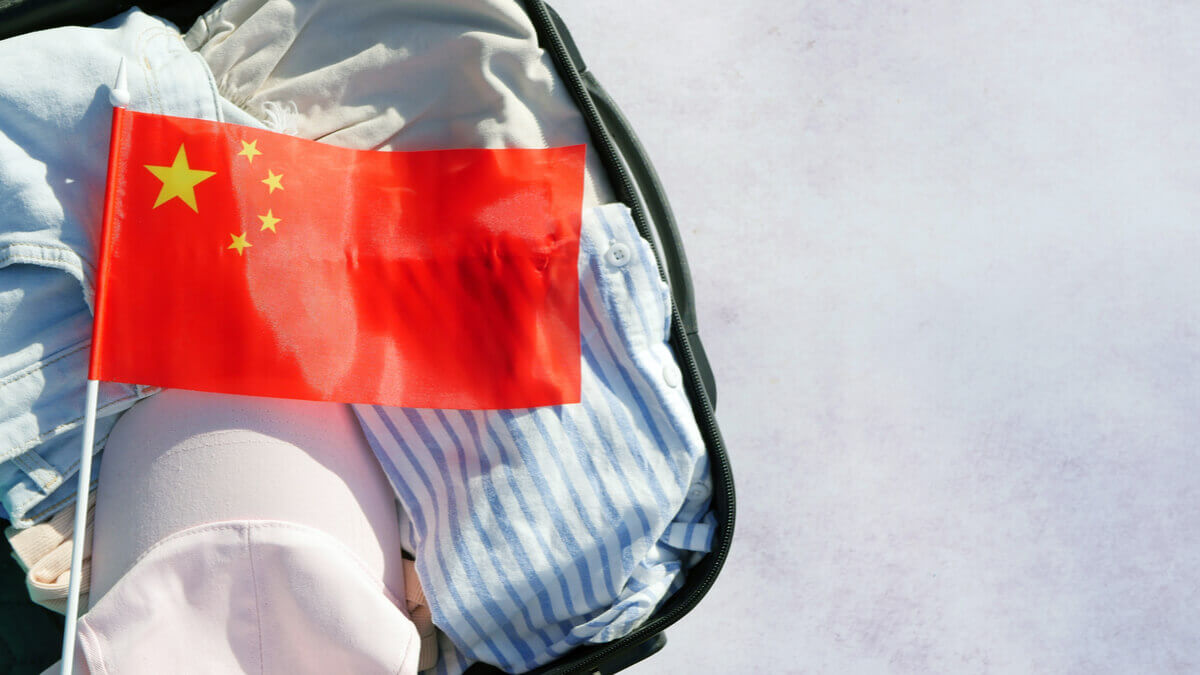Buying a boat from China as an American
Buying a boat from China? Learn all about pros & cons, step-by-step process, shipping prices, and taxes you have to deal with as an American.

If you’ve secured a new job in China or want to join relatives there, you’ll need to start planning your move.
But is it difficult for an American to move to China? And what should you do first? To help you get organized, we’ve put together a helpful guide covering everything you need to know about moving to China from the USA.
We’ll also introduce you to the Wise Account, a smart way to cut the costs of international transfers before, during and after your move.
First up, some basic facts you need to know about China:
Let’s start with the most important question - can you legally move to China as an American citizen?
The short answer is yes, but you’ll need the right paperwork.
There are a few different routes into China as a US national. You can move there for work, study or for other commercial activities. But you’ll need to make sure you get the right visa, especially if you plan to work in China.
But don’t worry, as we’ll cover what you need next.
There are a few different types of Chinese visa available for US citizens. If you’re just going for a vacation or to visit family, you’ll need a tourist visa. But for everything else, including working, you’ll need a specialist visa.
Here are a few of the main options:³
If you need to visit China for a conference, research visit or other non-commercial reasons, you’ll need an F visa.
The China business visa for US citizens lets you stay between 30 and 90 days.
If you’re visiting for commercial activities and trade, you’ll need an M visa. You’ll need an invitation from a business based in China to apply for this visa.
Importantly, while you can conduct business activities in China with this visa, you’re not permitted to work.
To work and earn money in China, you’ll need to apply for a Z visa. A key requirement is to have a job offer in place from a Chinese company, and you can stay for 3 months.
However, you may be able to renew your work visa or apply for a residence permit after that.
If you’ve been accepted on a university or other study course in China, you’ll need either an X1 or X2 visa. It all depends on the length of your course.
If you’re staying in China to study for less than 180 days, you’ll need an X1 visa. For stays of over 180 days, it’s the X2 visa. You’ll need copies of the admission notice from the educational institution.
The requirements and documents needed vary depending on which visa type you’re applying for. But generally, you’ll need to have:³
The China tourist visa for US citizens costs $185 USD.⁴
You can also pay an additional $25 for express turnaround, which knocks a day off the average visa processing time.⁴
Moving overseas is a huge decision. You’re likely to experience a culture shock, and there will be lots of new things to get used to.
So, is China a good place to move to? And what can you expect from your new life there?
To help you plan, we’ve put together some useful info that any American moving to China needs to know. This includes things like the cost of living, housing and how money and banks work in China.
To give you an idea of how far your money will go in China, it’s useful to look at average prices for everyday expenses.
Here are some examples, compared to prices in the US. For ease, we’ve given these costs in USD.
| Cost in China⁵ | Cost in the US⁵ | |
|---|---|---|
| Three-course meal for two people | $27.87 | $75 |
| Loaf of bread | $1.74 | $3.54 |
| 0.5 liter of domestic beer | $1.11 | $6 |
| Monthly public transport pass | $27.87 | $70 |
| Utilities - monthly (basic) | $54.12 | $188 |
| Rent for a 1-bedroom apartment in city center | $520.79 | $1707.31 |
| Price to purchase 1-bed apartment in city center - per sq.m | $8,158.11 | $4,692.35 |
03-Aug-2023
Of course, prices will vary considerably depending where in this huge country you choose to move to - and whether you’re living in a major city.
But on average, the cost of living in China is around 50% cheaper than the US, which is good to know. The only exception is property, which is much more expensive, as you can see from our table above.⁵
| 💡 Need a low-cost way to manage your everyday expenses? Get the Wise Multi-Currency Card, and you can spend in CNY from the moment you arrive in China. |
|---|
Before you can start thinking about everyday living costs in China, you’ll need to work out how much it’ll cost to actually get there. This includes flights for you and your family (and any pets), as well as costs for shipping your furniture and belongings.
You’ll need to get quotes from shipping companies for your specific departure and arrival destinations, and for how much stuff you have. But on average, you can expect to pay anywhere between $2,500 and $6,300.⁶
Sending your possessions by sea is generally cheaper than by air, but it’s much slower.
Finding somewhere to live will be one of the most urgent tasks on your moving to-do list.
As we’ve seen from our cost of living prices table, rent in China tends to be much cheaper than the US. Although, buying a property is more expensive. So, you’ll need to work out what’s best for your budget.
Renting could be a more flexible option, especially if you’re not staying for very long or need time to scout out suitable properties to purchase.
Most expats in China head for big cities, where large apartment blocks, serviced apartments and more luxurious apartments are the main property types. It’s also common for expat communities to live in villas or townhouses in gated communities on the outskirts of big cities.
As you’d expect from such an enormous country, China’s healthcare system varies considerably in standards of care, facilities, cost and ease of access.
Public healthcare facilities can be a little daunting for foreigners, primarily due to the language barrier. However, you can find some public hospitals in big cities which have ‘international’ wings for foreigners. Standards here tend to be in line with Western standards, and it’s a little cheaper than going private.
Otherwise, expats tend to use private healthcare facilities. These can have high fees, so medical insurance is a must.
If you’re moving to a new country, you’re likely to need a local bank account.
You can open a bank account in China as a US citizen, but you may need to wait until you arrive. This is because you’ll need to visit a branch in person to present your documents and verify your identity.
It’s unlikely that you’ll be able to open a bank account online, unless you sign up with an international bank.
If you need a business bank account, read this guide.
ATMs are very easy to come across in China, and most have instructions in English.
Another important thing to read up on before your move is how tax works in China.
China is known for its high standards of schooling, with a disciplined and exam-driven public school system.
As an expat though, the best option for your children could be an international school. Unlike public schools, classes are generally in English. However, these schools often have high fees.
China may be huge, but getting around is surprisingly easy and affordable.
Driving is usually a chaotic and frustrating experience though, so it could be best to make use of the country’s wide-reaching public transport system. Buses are cheap, and the railway network is extensive.
All major cities have taxis (although drivers don’t always speak English) and you can also fly between cities and tourist destinations.

Before you relocate, you’ll likely need to pay for services in China to cover your initial costs. For example, shipping, rental deposits, real estate fees or other basic charges. You might have things to buy from China in anticipation of your move.
So, it’s good to know you can cut the costs of sending money to China with Wise.
Wise uses mid-market exchange rates along with low, transparent fees. Arrange your payment online for convenience, and track your transfer in the Wise app at a glance.
You can also use the Wise Account to hold and exchange 40+ currencies - all with no minimum balance and no monthly fee.
And so you can spend like a local from the second you land, it’s worth getting yourself a Wise Multi-Currency Card for a one-time fee of just $9.
Wise is a money service business, offering a multi-currency account, international money transfer services and a debit card.
See how much you can save with Wise:
Please see Terms of Use for your region or visit Wise Fees & Pricing: Only Pay for What You Use for the most up-to-date pricing and fee information.
If you’re concerned about your safety when moving to China from America, you needn’t be. Generally speaking, China is as safe to live in as any other country in the world.
You’ll need to take steps to protect your safety, just as you would in the US. Do your research, have your documents in order (and keep them safe) and be aware that foreign tourists are sometimes a target for pickpockets in major cities.
You may need to move to a particular destination for your job or business, or to be near family.
But if you’re still deciding where to go, here are a few of the most popular cities to live in China as an expat:
We’ve covered a huge amount of information here in this guide, but it should give you an overview of what to expect during your move to China. And, of course, what kind of steps you need to take to prepare.
It’s always going to take time to adjust to life in a new country. But the more research you can do, the better.
You can now get on with applying for a visa, finding somewhere to live and planning how you’ll manage your money in China.
You can’t open a Chinese bank account until you arrive, but you can open a Wise Account online. This gives you a convenient, low-cost way to cover those initial relocation expenses. And with the Wise Multi-Currency Card, you’ll be able to spend in Chinese yuan as soon as you step off the plane.
Sources used for this article:
Sources checked on 03-Aug-2023.
*Please see terms of use and product availability for your region or visit Wise fees and pricing for the most up to date pricing and fee information.
This publication is provided for general information purposes and does not constitute legal, tax or other professional advice from Wise Payments Limited or its subsidiaries and its affiliates, and it is not intended as a substitute for obtaining advice from a financial advisor or any other professional.
We make no representations, warranties or guarantees, whether expressed or implied, that the content in the publication is accurate, complete or up to date.

Buying a boat from China? Learn all about pros & cons, step-by-step process, shipping prices, and taxes you have to deal with as an American.

In this article, explore WeChat Pay for foreigners. Uncover its access, features, and benefits for seamless transactions in China.

In this article, discover the ins & outs of obtaining a China Visa for US Citizens. From application processes to essential tips, get ready for seamless travel.

Wondering how the Chinese healthcare system works? Find everything you need to know in this comprehensive guide.

Only around 1% of the population in China are Christian. Religious practice, in general, is frowned upon by the state, and the Communist Party outlaws...

Home to 12 major cuisines, 55 minority ethnicities and more than 77 million businesses, it’s easy to see why China is so appealing to expats. Despite its...